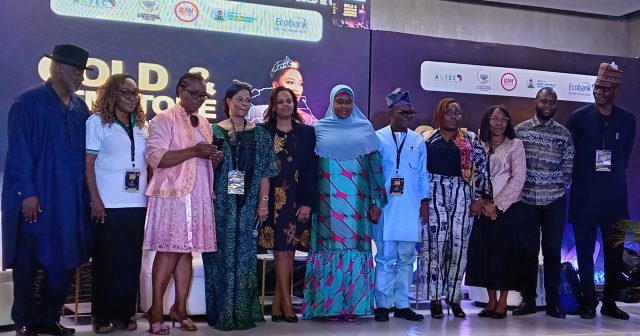Women in Mining Nigeria (WIMIN) marked the 2024 16 Days of Activism Against Gender-Based Violence (GBV) with a groundbreaking e-walk on December 4th.
This global campaign, held annually from November 25th (International Day for the Elimination of Violence against Women) to December 10th (Human Rights Day), aims to amplify voices against GBV and inspire collective action.
The virtual event, led by Dr. Engr. Janet Adeyemi, President of WIMIN, served as a platform to address the pressing issue of GBV, particularly within the mining sector and related communities.
Dr. Adeyemi reaffirmed WIMIN’s dedication to systemic reform, saying:
“WIMIN is committed to challenging patriarchal norms and fostering a safe, inclusive environment where women can thrive without fear of violence or discrimination.
Dr. Adeyemi also highlighted WIMIN’s ongoing initiatives, including:
● “Catalyzing Change: Eliminating SGBV in Mining Host Communities in Nasarawa State”, aimed at driving community-level advocacy and interventions.
● Gender Mainstreaming Projects in Ebonyi, Osun, Taraba, and Plateau states, addressing systemic inequalities in the mining sector.
● The Osun State Girls for Mining (G4M) Club, which empowers young girls with skills and knowledge to pursue careers in mining while fostering gender equity.
Distinguished Speakers.
The e-walk featured insights from a distinguished panel of experts, who shared strategies and perspectives on combating GBV:
● Mrs. Zenzi Awases, President of the Association of Women in Mining in Africa (AWIMA), discussed workplace GBV prevention strategies, emphasizing clear anti-GBV policies, confidential reporting mechanisms, and comprehensive training programs.
● Mrs. Judith Karangi, Chairperson of East Africa AWIMA, highlighted the mental health impact of sexual assault and stressed the importance of providing survivors with mental health services, legal support, and community-based recovery systems.
● Dr. Kelechukwu Okezie, Executive Director of NEW Foundation and Co-Chair of Catalyst 2030 (Africa Chapter), advocated for intersectional approaches, inclusive policies, and community-led solutions to address SGBV in marginalized communities.
● Mrs. Olusola Olaniyi, IWIM Advisory Council Member, examined the role of traditional masculine norms in perpetuating violence, encouraging men to challenge harmful behaviors and adopt healthier, equitable attitudes.
● Mrs. Chinaza Arukwe-Moses, Lead Administrator of the Switch Alumni Network, emphasized the role of technology in combating SGBV, including digital campaigns, e-learning platforms, and the use of AI to enhance prevention and response efforts.
Call to Action.
As the world approaches the 30th anniversary of the Beijing Declaration and Platform for Action in 2025, WIMIN remains resolute in demanding accountability and action from decision-makers to address GBV.
The organization calls on stakeholders to prioritize inclusive policies and sustainable solutions to create safer environments for women and girls.










